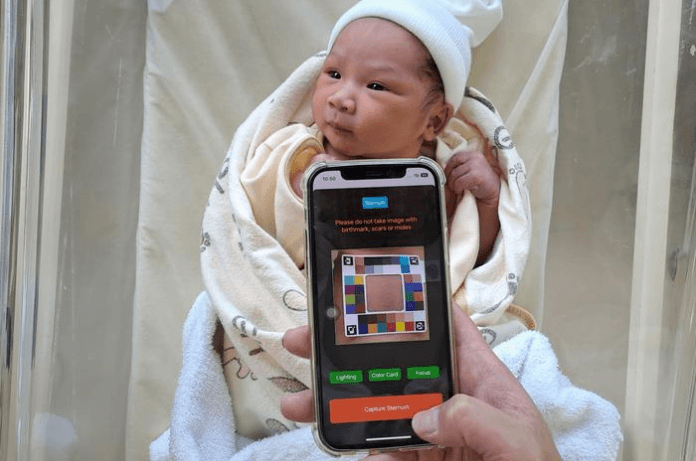Imagine a future where lifesaving healthcare tools fit right in your pocket! In Singapore, an AI-powered app, BiliSG is changing the game for parents, making it easier and safer to screen infants for neonatal jaundice—anytime, anywhere.
For the first two to three weeks of life, infants are usually subjected to frequent clinic visits for neonatal jaundice (NNJ) screening. This condition, affecting around 60% of term and 80% of pre-term infants, results from elevated levels of bilirubin, a yellow pigment produced during the breakdown of red blood cells. Left unchecked, severe jaundice can cause permanent brain damage and developmental delays.
However, frequent clinic visits for jaundice screening aren’t just inconvenient; they also expose vulnerable newborns to airborne diseases. Recognizing these challenges, Singapore General Hospital (SGH), in collaboration with SingHealth Polyclinics (SHP) and the national HealthTech agency Synapxe, has developed an innovative solution: the BiliSG app.
The BiliSG: AI-Powered App
BiliSG uses a machine learning model to predict bilirubin levels by analyzing skin color through images captured with a smartphone camera. To use the app, parents take pictures of their baby’s forehead, chest, and abdomen using a specially designed color-calibration sticker. The app then assesses the skin’s yellowness to determine bilirubin levels.
Clinical Assistant Professor Alvin Ngeow, Senior Consultant at SGH’s Department of Neonatal and Developmental Medicine, highlighted a critical difference between BiliSG and existing apps. “An app to screen neonatal jaundice is not new,” he explained. “Most of them, however, only take a single point of reference, such as the forehead. In contrast, BiliSG considers varying degrees of yellowness across different parts of the body, which enhances its accuracy.”
Development and Validation: A Two-Phase Journey
The development and validation of BiliSG spanned two phases.
Phase 1: From June 2022 to October 2023, focused on the app’s creation and initial machine-learning model development.
Phase 2: From November 2023 to June 2024, involved recruiting 352 clinically stable infants to undergo three types of jaundice tests, including the smartphone-based BiliSG.
The final model, completed in April 2024, was further validated with an additional 194 infants, demonstrating 100% sensitivity compared to traditional tests.
“This groundbreaking app will transform the way we protect the brain health of babies,” said Clinical Associate Professor Tan Ngiap Chuan, Director of Research and Primary Care Research Institute at SHP. “It allows parents to monitor their infants in the comfort of their homes, while family doctors can oversee their care through telemedicine.”
The Transformative Potential of AI in Healthcare
Andy Ta, Chief Data Officer & Director of Data Analytics & AI at Synapxe, emphasized the transformative potential of AI in healthcare. “The BiliSG© app illustrates how AI technologies can assist parents in monitoring their infant’s jaundice conveniently and safely at home.”
While neonatal jaundice typically resolves within two to three weeks as the baby’s liver matures, early detection and regular monitoring are crucial. Severe cases, if left untreated, can escalate to kernicterus, a type of brain damage that can result in permanent issues such as hearing loss, cerebral palsy, and intellectual disabilities. Thus, having a reliable, non-invasive tool like BiliSG© is a significant advancement in infant healthcare.
Looking Ahead: Expanding the Reach of BiliSG
BiliSG© is not just a tool; it represents a shift towards integrating AI into everyday healthcare practices, making medical care more accessible and less invasive. Parents, who often face anxiety over their newborn’s health, now have a proactive way to ensure their baby’s well-being, reducing the need for stressful clinic visits.
Looking ahead, the team plans to conduct further validation of BiliSG on a wider range of smartphone operating systems and camera specifications. They are also preparing for a pilot study to assess the app’s clinical feasibility in real-world settings. This means that soon, even more parents will be able to benefit from this innovative technology, potentially expanding its use beyond Singapore’s borders.
Moreover, the implications of this technology extend beyond just neonatal jaundice. The successful application of AI in BiliSG paves the way for future developments in mobile health apps that could screen for other conditions using similar technology. This marks a pivotal moment in healthcare, where technology and medicine converge to offer smarter, more efficient solutions for everyday health concerns.
A New Era in Infant Care
This innovation is set to redefine infant care in Singapore and beyond, ensuring that the health of newborns is safeguarded with ease and precision. With BiliSG, parents now have a powerful ally in their hands, ready to protect their little ones right from the start.

